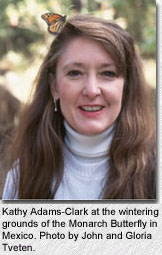Cerro Castelan is one of my favorite formations in Big Bend National Park.
We visit the park every summer for relaxation and a little photography.
The park is so spectacular that my photography seems to win out over my
husband's relaxation every time.
Cerro Castelan is a distinctive landmark that towers over the surrounding
desert. The mountain is a mass of volcanic and sedimentary layers ranging
in color from black to red to greenish. One side of the mountain's base,
the side where this photo was taken, is covered in ancient volcanic ash or
tuff. Under any light the mountain is spectacular but I wanted to try
something different. I wanted to photograph Cerro Castelan and the full
moon.
I started planning the shot two days in advance of the full moon by
consulting my moon rise chart and the topographic map. The chart gave me
the coordinates for the moon rise on the day before the full moon and the
topo map was used to get a general idea of my shooting opportunities.
These two tools gave me a general idea where to set-up my camera.
If you're going to include the full moon in a landscape, it's best to take
your shot on the evening before the true full moon. That's the evening
where the moon comes up in a light sky at the same time the sun is setting
in the opposite direction. The moon is well illuminated and the sky has
enough color to define features in the landscape.
We drove out to Cerro Castelan on the day of the shoot. I walked along the
road and climbed on the tuff with my compass and camera trying to find the
perfect shot. It turned out that the shot in my mind was not possible
without walking way out into the desert. I shifted gears and decided to
take the shot that the mountain was willing to give me.
We bummed around for the rest of the afternoon near Santa Elena Canyon and
ate dinner at Cottonwood Campground. The temperature moved below 100
degrees an hour before sunset and clouds started to form in the sky. I
began to panic that a thunder storm would roll in and obscure my moon so we
headed up to Cerro Castelan so I could get ready.
I set up my camera in my preplanned spot once we got to Cerro Castelan.
Clouds were forming in the east but I resisted my inclination to change
positions. The sun started to set in the west and my inner voice continued
to tell me that I should move to another vantage point. I resisted but was
beginning to doubt if I was in the right place to get my shot. There was
no moon anywhere in site and I was starting to panic.
I was turned around photographing the last colors of the setting sun when I
heard, "there it is!" I turned around and saw the moon rising above the
cloud bank. I set the camera on matrix meter, a +.7 ev, dialed in f22 with
the camera on aperture priority. I shot. Then zoomed out a bit to place
the moon on the golden third. The tuffs came into view and looked so
pretty with the puffy white clouds in the sky. I shot nearly a whole roll
of film, bracketing and changing the composition, as the moon rose in the
sky.
As I packed my camera gear into the car that evening, I knew I had a shot I
would like. But I never count my photos until they are hatched. I was
thrilled with the results when I got the film back two weeks later.
Velvia's color shift under low light was just want I wanted. Knowing the
traits of film and good planning paid off once again.
 Kathy Adams-Clark has been a professional nature photographer for five years.
She started her company in 1992 and left her corporate job in 1995 to work the
business full-time. Kathy markets the work of six other photographers (John &
Gloria Tveten, Peter Gottschling, Larry Ditto, Greg Lasley, Bill Draker,
and Glenn Hayes.) A year ago, Kathy's husband started writing a weekly nature
column for the Houston Chronicle called "Wonder of Nature." She provides the
research and photos for his column. In addition, she teaches nature
photography in the Houston area for Leisure Learning Unlimited and local
colleges. Her classes have also been offered by Houston Museum of Natural
Sciences. In November, Kathy will lead a photo tour to the Amazon Basin for
Voyagers International. The group will photograph an Indian market near Quito and
then head to the Tiputini Biodiversity Research Station to photograph
birds, reptiles and mammals.
Kathy Adams-Clark has been a professional nature photographer for five years.
She started her company in 1992 and left her corporate job in 1995 to work the
business full-time. Kathy markets the work of six other photographers (John &
Gloria Tveten, Peter Gottschling, Larry Ditto, Greg Lasley, Bill Draker,
and Glenn Hayes.) A year ago, Kathy's husband started writing a weekly nature
column for the Houston Chronicle called "Wonder of Nature." She provides the
research and photos for his column. In addition, she teaches nature
photography in the Houston area for Leisure Learning Unlimited and local
colleges. Her classes have also been offered by Houston Museum of Natural
Sciences. In November, Kathy will lead a photo tour to the Amazon Basin for
Voyagers International. The group will photograph an Indian market near Quito and
then head to the Tiputini Biodiversity Research Station to photograph
birds, reptiles and mammals.
Kathy's work has been published in many magazines including Birder's World, Bird
Watcher's Digest, Birds & Blooms, Ducks Unlimited, Texas Parks & Wildlife,
Texas Highways, and WOW. In addition her photography, she has been published in
the New York Times, National Geographic Books, and Audubon field guides.

